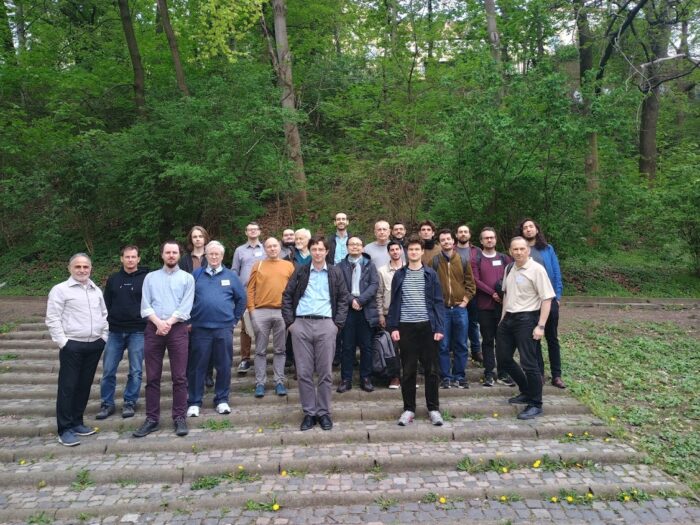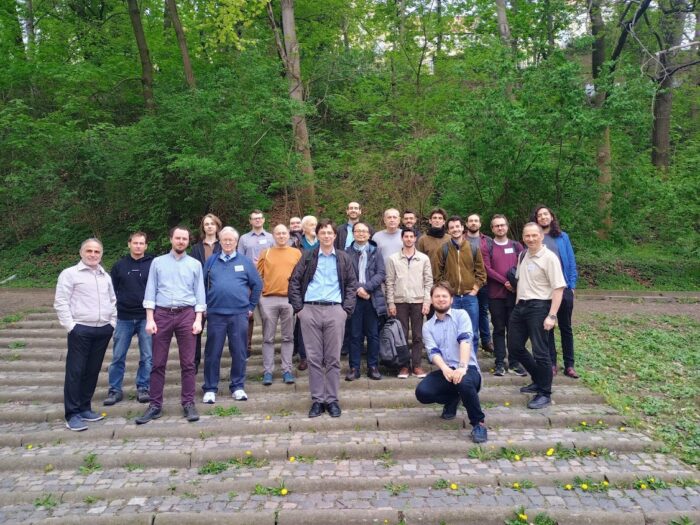Foundations of Mathematics, Truth, and Implicit Commitments, University of Warsaw, Warsaw, 11 – 13 April 2024
Venue: Institute of Applied Linguistics (Instytut Lingwistyki Stosowanej Uniwersytetu Warszawskiego), Dobra 55, Room 1.132 (first floor)
Conference Description
In recent years, the notion of implicit commitments has received new attention in the Philosophy of Mathematics. Focusing on theories of foundational interest, in which substantial parts of mathematics can be reconstructed, philosophers, mathematicians, and logicians have been trying to determine the extent of the commitments (if there are any) implicit in foundational theories. This investigation started in the 60s with the work of Solomon Feferman and others on the so-called’ reflection principles’, statements expressing, for a given theory S, that S is sound. Famously, Feferman investigated whether, for a foundational theory S, such reflection principles are implicit commitments of S. Since the 60s, Feferman’s investigation generated an enormous amount of literature and research programmes. Although much progress has been made in our understanding of implicit commitments, much work is still needed.
Our conference aims to provide a platform to gather philosophers, mathematicians, and logicians working on implicit commitments and related notions in the context of philosophy and the foundation of mathematics.
Registration
To register, please fill out the form provided at the following link by 9 April 2024.
Speakers
Andrea Cantini (University of Florence)
Ahmet Çevik (Gendarmerie and Coast Guard Academy)
Martin Fischer (LMU Munich & MCMP)
Kentaro Fujimoto (University of Bristol)
Volker Halbach (University of Oxford)
Leon Horsten (University of Konstanz)
Graham Leigh (University of Gothenburg)
J. Miguel Lopez Munive (University of Oxford)
Carlo Nicolai (King’s College London)
Simon Schmitt (University of Turin)
Michael Sheard (St. Lawrence University)
Albert Visser (Utrecht University)
Conference Program
11 April
09:50–10:00 Cezary Cieśliński, Welcome
10:00 –11:00 Andrea Cantini, A Fixed Point Theory over Stratified Truth
11:00–11:30 Coffee break
11:30–12:30 Graham Leigh, Truth, Proof & Realizability
12:30–14:30 Lunch
14:30–15:30 Carlo Nicolai, Some remarks on Classical determinate truth
15:30–16:00 Coffee break
16:00–16:45 Simon Schmitt, Set-theoretic Bicontextualism
16:45–17:00 Coffee break
17:00–17:45 J. Miguel Lopez Munive, Non-classical semantics for necessity conceived as a predicate
12 April
10:00–11:00 Volker Halbach, Reflecting on logic
11:00–11:30 Coffee break
11:30–12:15 Martin Fischer, Implicit Commitment, Reflective Closure and Conceptual Consequences
12:15–12:30 Coffee break
12:30–13:15 Michael Sheard, Proof Theoretic Circularity and the Liar
13:15–15:00 Lunch
15:00–16:00 Kentaro Fujimoto, Some variants of the theory of classical determinate truth
16:00–16:15 Coffee break
16:15–17:15 Open Problem Section
19:00 Conference dinner at Prodiz
13 April
10:00–11:00 Albert Visser, Restricted Sequential Theories
11:00–11:30 Coffee break
11:30–12:15 Ahmet Çevik, Structuralism and Choice-free Intuitionistic Theories
12:15–12:30 Coffee break
12:30–13:30 Leon Horsten, Reflection in the mathematical sciences
Abstracts
Andrea Cantini, A Fixed Point Theory over Stratified Truth. We look back to μ-calculus and take (loose) inspiration from work on intensional fixed points over 1st-order arithmetic, where one is allowed to build up fixed points in a very nested and entangled way. We experiment with strong systems and address the question: to what extent is a stratified (implicitly type theoretic) discipline compatible with self-reference or unfoundedness.
Ahmet Çevik, Structuralism and Choice-free Intuitionistic Theories. A raw object is a relational entity which is not equipped with a well-ordering. I introduce a novel constructivist account of structuralism by developing a theory of raw objects that are produced in case one does not assume any version of the Axiom of Choice (AC). I then argue, so as to demonstrate how constructive/intuitionistic positions of structuralism are affected on Choice-free intuitionistic philosophies of mathematical practice, that raw objects constitute in structuralism an intermediate ontology between ante-structures and systems. I also discuss the relationship between raw objects, unlabeled graphs, and Fine’s arbitrary objects, along with Horsten’s theory of generic structures. Consequently, raw objects seem to naturally appear in constructive/intuitionistic (hence, Choiceless) versions of structuralism.
Martin Fischer, Implicit Commitment, Reflective Closure and Conceptual Consequences. In the talk I intend to give a philosophical interpretation of Feferman’s work on implicit commitment. First, I connect Feferman’s conceptual structuralism to Gödel’s remarks on concepts and implication as a non-epistemic notion of conceptual consequence. The epistemic notions of implicit commitment and reflective closure as exemplified in the schematic theories are then connected to Gödel’s remark on the self-application of conceptual scheme. It will be argued that a notion of reflective closure based on PKF is an attractive alternative to the `artificial’ version based on KF, allowing for a definition of the determinate Tarskian truth predicates.
Kentaro Fujimoto, Some variants of the theory of classical determinate truth. Halbach and I recently proposed a new theory CD of determinate truth. This talk presents a few variants of CD and gives their proof-theoretic analysis. This is a joint work with Volker Halbach.
Volker Halbach, Reflecting on logic. In discussions about reflection principles, there is a strong focus on reflection on strong theories. I find reflecting on logic already hard. Reflection on theories presupposes reflection on logic, so we better understand reflection principles for logic. In order to reflect on logic, I use an axiomatic truth theory. I will argue why this truth theory permits us to prove the soundness of logic in a straightforward ‘naive’ way, as I envisage it.
Leon Horsten, Reflection in the mathematical sciences. This general talk discusses the role of reflection and reflection principles in the mathematical sciences. A distinction is made between ontological and epistemic reflection, and a corresponding distinction between ontological and epistemic reflection principles. Ontological reflection plays an important role in set theory; epistemic reflection principles play an important role in proof theory. I will also briefly discuss probabilistic reflection principles, which play a significant role in formal epistemology. I will close with what I take to be important open philosophical questions about reflection in the mathematical sciences.
Graham Leigh, Truth, Proof & Realizability. Compositional theories of truth tend to follow the Tarskian tradition, either the model-theoretic semantics for classical predicate logic or its generalisation to many-value and possible-worlds. Other realisations of truth, which includes computational interpretations and game semantics, have been largely ignored by truth theorists. In this talk I will present axiomatic rendering of Krivine’s “classical realisability”, a ‘truth as programs’ semantics for classical logic that validates extensions of Peano arithmetic (and generalises the Tarskian model). What sets this conception of truth apart from the Tarskian view is its treatment of falsity as primitive and truth as a derived notion. The traditional compositional theories of truth arise as special cases of classical realisability. This is joint work with Daichi Hayashi (Hokkaido University, Japan).
J. Miguel Lopez Munive, Non-classical semantics for necessity conceived as a predicate. The notion of necessity has been predominantly formalized as an operator since the proliferation of modal logic systems in the second half of the last century. This is partly a consequence of Montague’s results that the predicate version of the modal system T is inconsistent when combined with certain weak systems of arithmetic. In a series of recent papers, however, Halbach, Leitgeb and Welch have shown it is actually feasible to provide an operator-like possible-world semantics for necessity understood as a predicate. Since these authors work within classical semantics and they aim at preserving the intuitive reading of necessity, i.e., as truth in all accessible worlds, the key to avoiding the inconsistencies noted by Montague lies in restricting the definition of a possible-worlds model (PW-model) so as to avoid the problematic frames. In this talk I aim to clarify and further investigate the properties of this semantic framework when the underlying valuation scheme is non-classical. My starting point is Halbach and Welch’s application of the Strong-Kleene valuation scheme to the possible-worlds semantics for the necessity predicate, which mirrors Kripke’s fixed point semantics for the truth predicate. Using this framework, I first provide a definition of a (PW-model) for the language with the necessity predicate (the definition is only implicit in Halbach and Welch’s work). Subsequently, I prove that in this semantics, and in contrast to the classical case, there is no need to restrict the definition of a PW-model: all frames admit PW-models. Finally, I discuss how to generalize this result for all monotone valuation schemes (among them, van Fraassen’s supervaluationism).
Carlo Nicolai, Some remarks on Classical determinate truth. I present some observations on the theory of classical determinate truth (CD) recently introduced by Fujimoto and Halbach. The observations aim to show that there is a sense in which the primitive determinate predicate of CD could be dispensed with without compromising the logical strength and motivation of the theory. This is joint work with Luca Castaldo.
Simon Schmitt, Set-theoretic Bicontextualism. In this talk, I introduce a novel approach to addressing the question of absolute generality in set theory, i.e., whether we can quantify over all sets. Generality absolutists argue that it is possible to quantify over all sets, and that sentences like “every set is self-identical” fully convey their intended meanings only when interpreted over an unrestricted quantifier domain. In contrast, generality relativists dispute this possibility, often invoking an argument from paradox: For any supposedly all-inclusive collection M that contains all sets, reasoning akin to Russell’s paradox allows us to identify a set not contained in M. Thus, M cannot be all-inclusive, and since M was arbitrary, this line of reasoning disqualifies any collection from being all-inclusive. In this debate, we typically see absolutists and relativists firmly entrenched in their views, each denying the validity of the opposing perspective. However, this strict division overlooks the potential for an intermediate position. Such a position would allow an absolutist interpretation of straightforward sentences like “every set is self-identical”, while allowing only a relativist interpretation of sentences involved in paradoxical reasoning. Drawing on the higher-order semantics developed by Rayo & Uzquiano in their 1999 paper “Towards a Theory of Second-Order Consequence”, my approach offers a nuanced method for interpreting the language of set theory. Contrary to existing accounts that uniformly apply either an absolutistic or a relativistic interpretation over an entire language, I propose that it is possible – and indeed, more coherent – to interpret only certain sentences over an all-inclusive domain. The main aim of this talk, therefore, is to develop this approach and to propose a semantic theory that allows us to distinguish between sentences that are inherently absolutistic and those that are not.
Michael Sheard, Proof Theoretic Circularity and the Liar. The notion of circularity is intimately connected with our understanding of the Liar paradox. Even just the formulation of the Liar sentence requires circularity of reference; attempts to assign a truth value to the Liar sentence results in semantic circularity; proposals to resolve or explain away the paradox have resulted in what might be called circularity of resolution, in the form of the Strengthened Liar paradox and other “revenge” phenomena. In this talk I will add a form of proof-theoretic circularity to this list. Specifically, I will show how an attempt to apply the process of cut elimination to a particular derivation of the Liar paradox leads to yet another kind of circularity. I will conclude the presentation with some thoughts about the philosophical implications of proof-theoretic circularity, and what it might tell us about the essence of the Liar paradox and our attempts to create a robust theory of type-free truth.
Albert Visser, Restricted Sequential Theories. This talk reports partly on research in collaboration with Ali Enayat and Mateusz Łełyk. I build a modest framework for proving incompleteness results. This framework uses exclusively the partial Liar. We apply our framework to show that consistent sequential c.e. theories do not have a consistent completion of restricted depth-of-quantifier-alternation complexity. Then, I discuss the Small-is-very-small Principle and show that this delivers an inconsistency statement that is independent of a given consistent sequential theory axiomatised with sentences of restricted depth-of-quantifier-alternation complexity. Here, the axiom set itself can have any complexity. (Unfortunately, the argument does not work for restricted completions of consistent sequential c.e. theories.)

